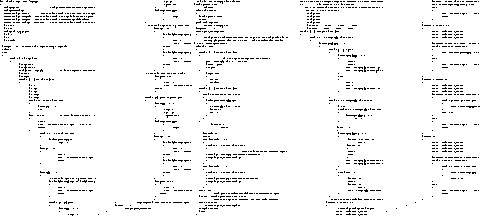
parsess < /dev/null.
parsess < parsess.
parsess 0, ,0 2-1,0 100,100.
char * abuse tests.
| 100 | 200 | 300 | 400 | 500 | |
|---|---|---|---|---|---|
| 0 | 1 | 1 | |||
| 10 | 2 | 1 | |||
| 20 | 2 | ||||
| 30 | 1 | 1 | |||
| 40 | |||||
| 50 | |||||
| 60 | 1 | 1 | |||
| 70 | 3 | 1 | |||
| 80 | 1 | 1 | |||
| 90 | 1 | 1 | 1 | ||
| Totals | 1 | 6 | 3 | 8 | 2 |
| 000 | 100 | |
|---|---|---|
| 0 | 2 | |
| 10 | 1 | |
| 20 | 2 | |
| 30 | 3 | |
| 40 | 2 | |
| 50 | ||
| 60 | 4 | |
| 70 | 1 | 2 |
| 80 | ||
| 90 | 3 | |
| Totals | 1 | 19 |
| total | pages per procedure | |||||||
|---|---|---|---|---|---|---|---|---|
| procs | 1 | 2 | 3 | 4 | 5 | 6 | 7 | 8 |
| 2 | 1 | 1 | ||||||
| 2 | 1 | 1 | ||||||
| 2 | 1 | 1 | ||||||
| 3 | 1 | 1 | 1 | |||||
| 4 | 2 | 1 | 1 | |||||
| 4 | 2 | 1 | 1 | |||||
| 6 | 4 | 1 | 1 | |||||
| 9 | 4 | 4 | 1 | |||||
| 9 | 6 | 2 | 1 | |||||
| 10 | 4 | 5 | 1 | |||||
| 11 | 5 | 3 | 2 | 1 | ||||
| 11 | 8 | 2 | 1 | |||||
| 13 | 10 | 3 | ||||||
| 15 | 11 | 3 | 1 | |||||
| 16 | 13 | 2 | 1 | |||||
| 17 | 16 | 1 | ||||||
$ parsess < /dev/null Invalid Input $
$ parsess < /dev/null Requires minimum one argument .... $
$ echo aaaa bbbb | ./parsess 0,0 0,1 aaaa bbbb $
mains()

int main(int argc, char* argv[])
{
get_ss_text();
compute_columns();
find_ss_cells(argc, argv);
return 0;
}
char local_argv[25]
for (p = 1; p < argc; p++) {
strcpy(local_argv, argv[p])
// whatever
}
string str
char ch[200]
while(true) {
if (!cin.eof()) {
cin.getline(ch, 200, '\n')
str = ch
// whatever.
}
This code fails for 200+ character input lines.
What possible explanation is there for code like this?
string str
while (getline(cin, str)) {
// whatever
}
if (r_bstr[i] < 48 || r_bstr[i] > 57)
48? 57? What are these? Are you sure?
if (str1[loc] == 32) // 32 is ASCII char sp
Oh? Is everything ASCII?
char ch[200] while cin.getline(ch, 200, '\n') ... f(200) ...
Have you changed all proper values?
Have you left alone all other values?
while !cin.eof() getline(cin, s ) if (s.size() != 0)
while true
if !cin.eof()
getline(cin, line)
while getline(cin, s) // whatever
while getline(std::cin, s)
if std::cin.eof()
break
while cin.good() && !cin.eof() && cin.get(ch)
if EOF == ch
break
good() implies !eof().
ch is not set to EOF.
if cin.peek() == EOF
exit(-1)
while !cin.eof()
if cin.peek() == EOF
break
getline(cin, spread)
if (len < recLen)
for (int j = 0; j < (recLen - len); j++)
line = line + ' ';
This is complicated, expensive, and slow.
space = ss_vec[j][k+1].length - ss_vec[j][k].length; (ss_vec[j][k].cell).append(space, ' ');
This is not.
$ echo aaaa bbbb | parsess 0,0 first_row = 0 last_row = 0vs[0] = aaaa bbbb ! Out of range spec $
$ parsess < /dev/null No Element-Specs supplied. Nothing to do... ...Doing nothing. ba'Bye $
This page last modified on 26 September 2002.